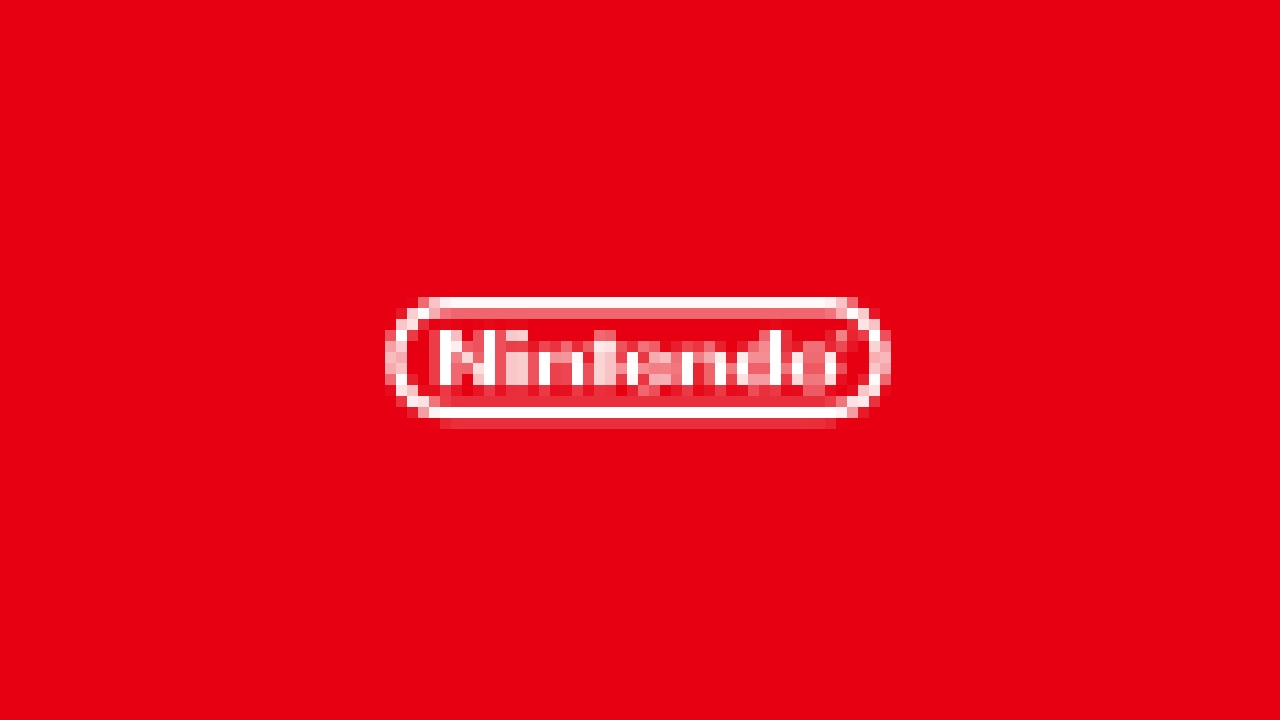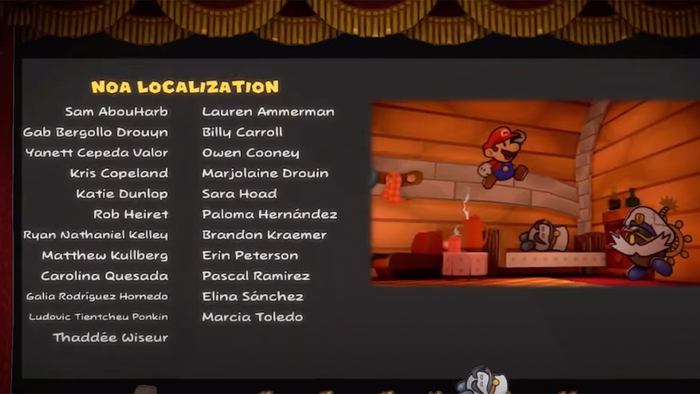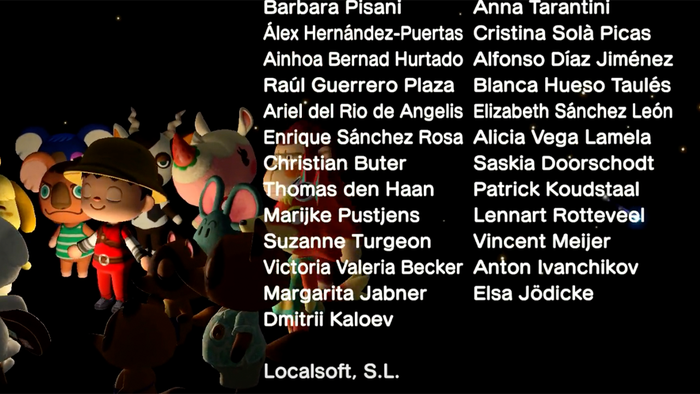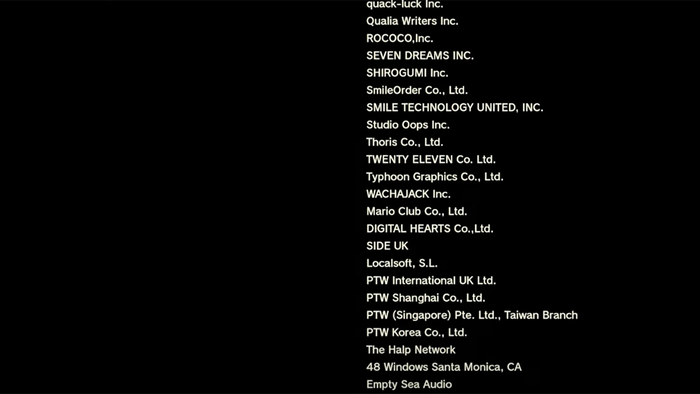Trending
Opinion: How will Project 2025 impact game developers?
The Heritage Foundation's manifesto for the possible next administration could do great harm to many, including large portions of the game development community.
External translators who've worked on major franchises including The Legend of Zelda and Animal Crossing have been refused credits and locked into decade-long NDAs.

Nintendo has failed to credit external translators who worked on major first-party titles including The Legend of Zelda: Tears of the Kingdom, Animal Crossing: New Horizons, and Super Mario RPG.
Multiple sources, who chose to remain anonymous for fear of reprisal, have told Game Developer how Nintendo repeatedly failed to credit them for their work on a litany of critically acclaimed titles—despite them spending months translating each project for audiences around the world.
One source, who previously worked at Nintendo before becoming a freelance translator, said they were always credited as an in-house employee, but noted that wasn't necessarily the case in other departments.
"I was always credited [at Nintendo]. I remember seeing my name in the credits of a Nintendo game for the first time. It feels really great to be acknowledged for your work. It's like a warm thank you from the developers and the company for all the work you put in," they explained.
"I do remember one project where the company decided not to put the in-house testers in the credits. This was one of the Professor Layton games by Level-5. Nintendo of Europe handled the localization and publishing for the Layton series at the time. The translators on that project protested strongly against this decision, but in the end the testers were not credited for this project. I don’t know if this has since become policy."
After departing the Japanese company, they continued working on Nintendo projects as a contractor through service provider Localsoft. They have yet to be credited for their work on Nintendo titles through Localsoft and claim they also worked on Nintendo projects at Keywords—where they also failed to receive a credit.
"I kind of accepted [miscrediting] as 'part of the business' but that doesn’t mean it's fair or right. The fact that these companies are not able to give any reasonable explanation for omitting external translators (and even developers) from their credits is proof of this, I think" they continued.
"Professionally, it's hard to tell how much this has impacted me. It's entirely possible that more translation agencies would have approached me if my name was out there in all these big blockbuster Nintendo games, but who knows?"
Those claims were corroborated by another source, who spent over a year working on multiple Nintendo projects at Localsoft but haven't been credited. "It is Nintendo's policy to not list the name of translators from external agencies in their game credits, which also forbids us from listing those titles on our CVs," explained our source.

A robust list of credits for the NOA localization team in Paper Mario: The Thousand-Year Door. External translators don't receive the same treatment.
They said, when working on Nintendo titles as an external translator, they were asked to sign non-disclosure agreements (NDAs) with a standard duration of 10 years, prohibiting them from discussing or promoting their work. Game Developer has viewed an email that confirms Nintendo used a decade-long NDA on multiple projects.
"If you look at the credits for Paper Mario: The Thousand-Year Door, for instance, you will notice that only six people were credited for localizing a full title that's available in eight languages," our source continued. "[In my experience] a game like this would normally be localized by a team of around 25 translators. Some languages are skipped over completely like they got magically added to the game.
"For games like Animal Crossing or Breath of the Wild you don't really notice that 15 or 20 translators are not in the credits, as there are all the other names from their in-house translators, which is why Nintendo's policy of miscrediting might have flown under the radar. But almost every big title that Nintendo releases which uses external translators actually fails to credit translators."
They stressed the prevalence of miscrediting is "ridiculous" and prevents workers from championing themselves and furthering their career. "You work on an award-winning title with newspapers and magazines raving about your work, and you’re forced to hide the fact that you actually were a part of that for 10 years," they added.

Localsoft in the credits for Animal Crossing: New Horizons. The company was placed below the names of Nintendo's internal localization workers.
Another source, who was employed by Localsoft as an external translator, worked on titles such as Animal Crossing: New Horizons and The Legend of Zelda: Tears of the Kingdom for months. Much like their peers, they have yet to be credited for their contributions.
"We were never openly told that we wouldn't be credited, it was just a topic we sometimes discussed among us Localsoft translators during lunch breaks," they said. "It was upsetting, but sadly, that's generally how things work when working through translation agencies, so as much as we were upset (at least some of us), in the end, we shrugged it off as just another day in translation."
Our source considered raising the issue with Localsoft at the time, but felt the company would simply feed them excuses. "That's how it always goes," they continued. "The agencies and the clients just play the blame game endlessly. It is my opinion that the clients don't care, and the agencies have everything to gain from keeping their vendors, us the translators, in the dark. When it comes to money, fees, contracts and anything related, everything shifts to dark mode."
They claimed Localsoft leaders told staff to avoid discussing workplace issues with their colleagues, and that translators are frequently penalized for sharing information that studios and employers feel should be kept under wraps. "There's a very perceptible 'don't tell' mentality in this line of work," they said.
After realizing they hadn't been credited for their work, they admitted to being "upset but not surprised." On a personal level, being miscredited prevented them from telling friends and family about their work. It was, they said, incredibly demoralizing. On a professional level, the impact was more insidious.
"I felt I would benefit from being able to state I worked on the title when offering my services to new clients. Not to mention that I actually spent a fair amount of time working almost exclusively for them," they added. "When the whole project was done, it took me months to get some steady work going again as I had been unavailable for so long. So logically, I felt robbed, but in an all too familiar way—which says a lot about this line of work."

Localsoft received a 'Special Thanks' for its work on Tears of the Kingdom, but individual translators weren't credited.
Ultimately, they said freelance translators are always "caught in the middle" of the biggest companies—whether that's the service provider that hired them or the studio overseeing development.
As we've seen in the past when instances of miscrediting were highlighted on projects such as Skull & Bones and Baldur's Gate III, the service providers often blame their partner studios, while the studios themselves point the finger in the opposite direction. It's a debilitating situation that leaves those impacted by miscrediting seeking clarity and correction without any real means of reprisal.
"The closed circuit between game companies and translation agencies is as opaque as it can be so that the agencies can make as much profit as they can. If the game company makes a bad call, the agency will roll with it 100 percent. If the game company screws the translators over, the agency will nod their heads and feed on what's left. And if the agencies can get you to work more for less, even though the company didn't ask for it, they will," our source continued.
"It is nigh impossible for translators to push back against this structure. Anyone trying will get blacklisted before getting anywhere. This is a field where taking an annual break can shut you out of months of work. No one cares what we think because there's literally nothing we can do about it, and that's even if we were willing to forfeit our livelihood for the greater good.
"Perhaps the bigger question is why are externalized translators so often left out? Why would companies be inclined to refuse to credit them in the first place? Who benefits from this obfuscation? And why is it so common practice to strip all of these people of any recognition for their work?"
Game Developer reached out to Nintendo, Keywords, and Localsoft weeks before publishing this article in search of answers. We've yet to hear back.
Read more about:
Top StoriesYou May Also Like